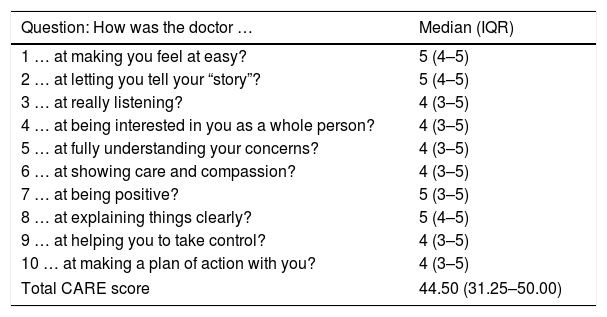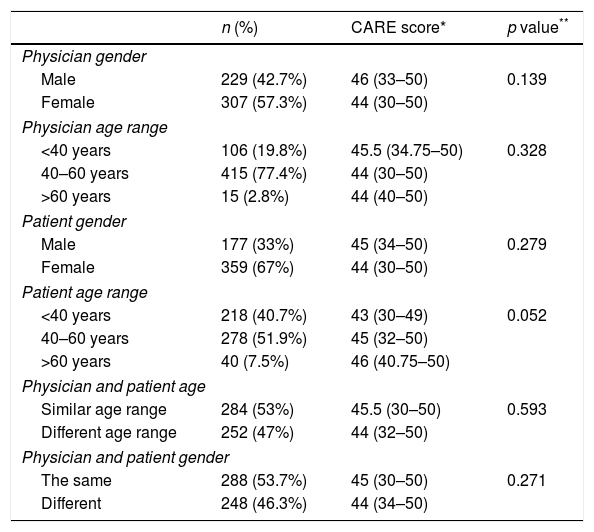A good patient–physician relationship in inflammatory bowel disease (IBD) is very important and physician empathy is its cornerstone. There is no evidence about if age and/or sex of physicians and patients could influence on perceived empathy by patients. The aim of the study was to assess the level of empathy of IBD specialist physicians perceived by their patients and if it varies according to the age and gender of the patient and the physician.
MethodsWe performed a national cross-sectional study based on voluntary online survey to IBD patients that included the Consultation and Relational Empathy (CARE) scale.
ResultsFive hundred sixty one responses to the survey were received. After applying exclusion criteria, 536 patients were included in the analysis. Total median score of CARE scale was 44.5 (maximum possible score: 50 points). Most of the patients (99.1%) considered the contents of the questionnaire to be an important issue. There were no significant differences in CARE scale scores in function of patient/physician age range or gender [physician gender: males vs. females: median 46 vs. 44, p=0.139; physician age: <40 years, 40–60 years, >60 years: 45.5 vs. 44 vs. 44, p=0.328].
ConclusionSpanish inflammatory bowel disease patients have a great physician empathy perception, which is the key to a good patient–physician relationship, and this fact is not influenced by age or gender of patients or inflammatory bowel disease specialist.
Una buena relación médico-paciente con enfermedad inflamatoria intestinal (EII) es muy importante y la empatía del médico desempeña un papel clave para conseguirla. No hay evidencia sobre si la edad o el género de médicos y pacientes podría influir en la empatía percibida por los pacientes. El objetivo del estudio es evaluar el nivel de empatía del médico especialista en EII percibida por sus pacientes y si esta varía en función de la edad o el sexo del paciente y el médico.
MétodosEstudio transversal nacional basado en la realización de encuestas voluntarias telemáticas por pacientes con EII, completando la escala Consultation and Relational Empathy (CARE).
ResultadosSe recibieron 561 respuestas a la encuesta. Tras aplicar los criterios de exclusión, 536 pacientes fueron incluidos en el análisis. La mediana de la puntuación total en la escala CARE fue de 44,5 (puntuación máxima posible 50 puntos). La mayoría de pacientes (99,1%) consideraron los contenidos del cuestionario como aspectos de alto interés. No se encontraron diferencias significativas en la puntuación de la escala CARE en función del rango de edad o el género de pacientes y médicos (género del médico: hombres vs. mujeres: mediana 46 vs. 44, p=0,139; edad del médico: <40 años, 40-60 años, >60 años: 45.5 vs. 44 vs. 44, p=0,328).
ConclusiónLos pacientes españoles con EII han reportado unos altos niveles de empatía percibida, lo cual es clave para una buena relación médico-paciente, y este factor no está influido por la edad ni el género de los pacientes o el especialista en EII.








